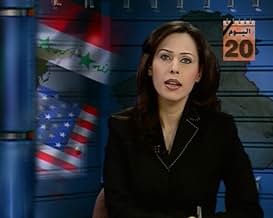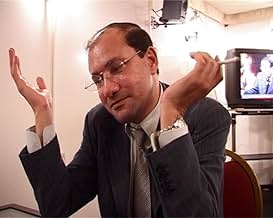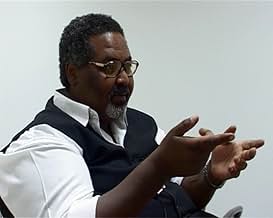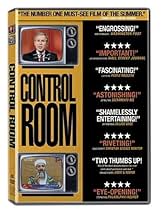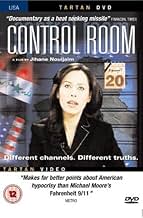PUNTUACIÓN EN IMDb
7,7/10
5,3 mil
TU PUNTUACIÓN
Añade un argumento en tu idiomaA documentary on perception of the United States's war with Iraq, with an emphasis on Al Jazeera's coverage.A documentary on perception of the United States's war with Iraq, with an emphasis on Al Jazeera's coverage.A documentary on perception of the United States's war with Iraq, with an emphasis on Al Jazeera's coverage.
- Premios
- 9 premios y 10 nominaciones en total
Josh Rushing
- Self
- (as Lt. Josh Rushing)
George W. Bush
- Self
- (metraje de archivo)
Donald Rumsfeld
- Self
- (metraje de archivo)
Argumento
¿Sabías que...?
- Citas
Lt. Josh Rushing: It makes me hate war, but it doesn't make me believe that we're in a world that can live without war yet.
- Banda sonoraControl Room Intro Theme
Written by Kinan Azmeh and Dinuk Wijeratne on a theme by Béla Bartók (as Bartok)
Performed by Kinan Azmeh and Dinuk Wijeratne
Courtesy of Kinan Azmeh and Dinuk Wijeratne
Reseña destacada
I spent some of last summer in Spain, traveling alone for a couple weeks, as well as another week with my father, a Colombian immigrant. The two and a half weeks that I spent there alone were an unforgettable experience, despite the difficulty of speaking only the most basic, functional Spanish. I essentially knew how to order coffee and ask where the bathroom was, so I was limited to going into cafés and pubs and ordering what I could point to. Once my father arrived, speaking perfect Spanish, I was able to experience a much wider variety of what Spain has to offer (not the least of which is the astonishingly delicious paella), and my father, having not been back to Colombia in 35 years and never having been to Europe, was equally astounded not just by the class and sophistication of the country and its people, but by what could be found in bookstores.
Upon visiting the breathtaking Guggenheim Museum in a moderate sized town in northern Spain called Bilbao, my father came upon a Spanish book about the war in Vietnam. In perusing through the book, he and I were both shocked at the things that were shown in it, particularly of the atrocious acts of American soldiers. It's not portraying America in a bad light, just not portraying them only in a good light, it shows both sides, and it shows that the news outlets in America really play a serious role in, to use the red flag word, propagandizing wars.
Control Room is a study of the Arab news network al Jazeera and how this trend continues to this day. It is well known that the Bush administration is among the most secretive administrations in United States history, under the pretext of the struggle against terrorism and the dangers in alerting the public, and thus the enemy, to all of its policies and actions. What is truly disturbing, however, is the extent to which this secrecy, at some level justified, is so grandly abused. Donald Rumsfeld, our Secretary of Defense under President Bush, appears a couple of times vehemently condemning anyone associated with al Jazeera as a liar, propagandist, enemy of freedom, terrorist, etc. Basically he makes no secret of his opinion that the network itself is a terrorist organization populated and run by all of the above caricatures created by the rhetorical Bush administration.
The movie's most moving sequences, interestingly enough, are those that feature Iraqis, who look exactly what most Americans associate with the typical insurgent or terrorist, sitting around and debating what to do about the impending war, how to protect their children, their families, their livelihood, their lives. Where Michael Moore went completely over the top, showing kids dancing in the streets under Saddam and people getting married (his intent to show some level of normal life, even under Saddam, was instantly eclipsed by his opponents immediately pretending that he wants people to believe Moore thought it was all fun and games under Hussein), Control Room simply walks in with a camera, filming normal Iraqi men and women anxiously watching the news, fearful for their safety, not from Hussein and not even from their liberators, but from the invaders.
In one telling scene, an Iraqi man criticizes Saddam Hussein, itself a dangerous thing to do under the dictatorship, for not being more prepared for the incoming attack in order to protect himself. This man was disappointed in Saddam not for being a brutal dictator, but for allowing the Americans to take over.
The most damaging assessment that the movie makes against Americans is the way the Arab news outlets were destroyed. In one day, three separate attacks were clearly aimed at news outlets, under the pretense that they were distributing terrorist propaganda, but still with the result that it showed the Iraqi and all of the Arab world that the Americans want total control of what anyone hears about the war. As Bush said, you're either with us or against us. It kind of reminds me of how, if any newspaper or television news station or any kind of media outlet criticizes one of the countless blunders made by the Bush administration, it is instantly dubbed left-wing media by mostly the more idiotic right wing nutcases, like Rush Limbaugh, Michael Savage, and the malicious Ann Coulter.
Theaters and video stores, in the run up to the 2004 election, have been increasingly bombarded with a barrage of political documentaries, mostly after Michael Moore's Fahrenheit 9/11 opened the floodgates of political fervor in the film and video industry. Both sides are guilty of underhanded tactics, and Control Room is not entirely free of taking one side or the other, but it doesn't do it in the same way that Fahrenheit 9/11 twisted things and theorized, nor does it do it in the same way as Fahrenhype 9/11, which criticized Fahrenheit 9/11 as much as possible for as many different underhanded tactics as possible, and then went on to employ those same tactics itself.
Control Room is not a fancy documentary; it was filmed, I believe, entirely on MiniDV, which is becoming the standard in home video cameras, and is comprised mostly of people involved with al Jazeera talking about what it's like to work there, as well as interviews between al Jazeera reporters and American soldiers. Personally, the most disturbing moments in the film were the entirely believable suggestion that the Iraqis celebrating in the streets when Saddam's statue was torn down were brought in by the Americans for the purpose of the photo shoot (this is the definition of textbook military propaganda), and the sickening scene in which one soldier absolutely insists that the nation of Iraq is at least partially responsible for the chaos that followed the fall of Saddam.
This, more than anything else I've ever seen in news or any kind of media, is the clearest example of the total lack of any kind of postwar planning by the Bush administration. They were so clueless about what was going to happen even minutes after they succeeded in taking out Saddam Hussein (by the way, I say 'they' referring to the Bush administration, not to Americans as a whole, in which case I would, of course, use 'we') that I genuinely wonder if they even planned on how to get the soldiers back home to America, or if they thought that Saddam was gone so let's go back to Camp David and play golf.
Oops, there I go going over the top. Now I sound like Michael Moore. But the point that the movie sets out to make, and succeeds in very well, is showing that all sides are necessary. No one side can be in control of all news outlets, because that is a recipe for propaganda. And not only do we have to make sure to allow other people to broadcast their views, we can't just go in and destroy their news stations and claim that it was because they were terrorist agencies, because that act alone presents America as the bullies and, given our logic (or lack thereof) in attacking Iraq after 9/11 rather than seeking out that tragedy's perpetrators, we're doing badly enough in that area already.
Upon visiting the breathtaking Guggenheim Museum in a moderate sized town in northern Spain called Bilbao, my father came upon a Spanish book about the war in Vietnam. In perusing through the book, he and I were both shocked at the things that were shown in it, particularly of the atrocious acts of American soldiers. It's not portraying America in a bad light, just not portraying them only in a good light, it shows both sides, and it shows that the news outlets in America really play a serious role in, to use the red flag word, propagandizing wars.
Control Room is a study of the Arab news network al Jazeera and how this trend continues to this day. It is well known that the Bush administration is among the most secretive administrations in United States history, under the pretext of the struggle against terrorism and the dangers in alerting the public, and thus the enemy, to all of its policies and actions. What is truly disturbing, however, is the extent to which this secrecy, at some level justified, is so grandly abused. Donald Rumsfeld, our Secretary of Defense under President Bush, appears a couple of times vehemently condemning anyone associated with al Jazeera as a liar, propagandist, enemy of freedom, terrorist, etc. Basically he makes no secret of his opinion that the network itself is a terrorist organization populated and run by all of the above caricatures created by the rhetorical Bush administration.
The movie's most moving sequences, interestingly enough, are those that feature Iraqis, who look exactly what most Americans associate with the typical insurgent or terrorist, sitting around and debating what to do about the impending war, how to protect their children, their families, their livelihood, their lives. Where Michael Moore went completely over the top, showing kids dancing in the streets under Saddam and people getting married (his intent to show some level of normal life, even under Saddam, was instantly eclipsed by his opponents immediately pretending that he wants people to believe Moore thought it was all fun and games under Hussein), Control Room simply walks in with a camera, filming normal Iraqi men and women anxiously watching the news, fearful for their safety, not from Hussein and not even from their liberators, but from the invaders.
In one telling scene, an Iraqi man criticizes Saddam Hussein, itself a dangerous thing to do under the dictatorship, for not being more prepared for the incoming attack in order to protect himself. This man was disappointed in Saddam not for being a brutal dictator, but for allowing the Americans to take over.
The most damaging assessment that the movie makes against Americans is the way the Arab news outlets were destroyed. In one day, three separate attacks were clearly aimed at news outlets, under the pretense that they were distributing terrorist propaganda, but still with the result that it showed the Iraqi and all of the Arab world that the Americans want total control of what anyone hears about the war. As Bush said, you're either with us or against us. It kind of reminds me of how, if any newspaper or television news station or any kind of media outlet criticizes one of the countless blunders made by the Bush administration, it is instantly dubbed left-wing media by mostly the more idiotic right wing nutcases, like Rush Limbaugh, Michael Savage, and the malicious Ann Coulter.
Theaters and video stores, in the run up to the 2004 election, have been increasingly bombarded with a barrage of political documentaries, mostly after Michael Moore's Fahrenheit 9/11 opened the floodgates of political fervor in the film and video industry. Both sides are guilty of underhanded tactics, and Control Room is not entirely free of taking one side or the other, but it doesn't do it in the same way that Fahrenheit 9/11 twisted things and theorized, nor does it do it in the same way as Fahrenhype 9/11, which criticized Fahrenheit 9/11 as much as possible for as many different underhanded tactics as possible, and then went on to employ those same tactics itself.
Control Room is not a fancy documentary; it was filmed, I believe, entirely on MiniDV, which is becoming the standard in home video cameras, and is comprised mostly of people involved with al Jazeera talking about what it's like to work there, as well as interviews between al Jazeera reporters and American soldiers. Personally, the most disturbing moments in the film were the entirely believable suggestion that the Iraqis celebrating in the streets when Saddam's statue was torn down were brought in by the Americans for the purpose of the photo shoot (this is the definition of textbook military propaganda), and the sickening scene in which one soldier absolutely insists that the nation of Iraq is at least partially responsible for the chaos that followed the fall of Saddam.
This, more than anything else I've ever seen in news or any kind of media, is the clearest example of the total lack of any kind of postwar planning by the Bush administration. They were so clueless about what was going to happen even minutes after they succeeded in taking out Saddam Hussein (by the way, I say 'they' referring to the Bush administration, not to Americans as a whole, in which case I would, of course, use 'we') that I genuinely wonder if they even planned on how to get the soldiers back home to America, or if they thought that Saddam was gone so let's go back to Camp David and play golf.
Oops, there I go going over the top. Now I sound like Michael Moore. But the point that the movie sets out to make, and succeeds in very well, is showing that all sides are necessary. No one side can be in control of all news outlets, because that is a recipe for propaganda. And not only do we have to make sure to allow other people to broadcast their views, we can't just go in and destroy their news stations and claim that it was because they were terrorist agencies, because that act alone presents America as the bullies and, given our logic (or lack thereof) in attacking Iraq after 9/11 rather than seeking out that tragedy's perpetrators, we're doing badly enough in that area already.
- Anonymous_Maxine
- 4 nov 2004
- Enlace permanente
Selecciones populares
Inicia sesión para calificar y añadir a tu lista para recibir recomendaciones personalizadas
Detalles
Taquilla
- Recaudación en Estados Unidos y Canadá
- 2.589.616 US$
- Fin de semana de estreno en EE. UU. y Canadá
- 27.125 US$
- 23 may 2004
- Recaudación en todo el mundo
- 2.724.826 US$
Contribuir a esta página
Sugerir un cambio o añadir el contenido que falta

Principal laguna de datos
By what name was Control Room (2004) officially released in Canada in English?
Responde


